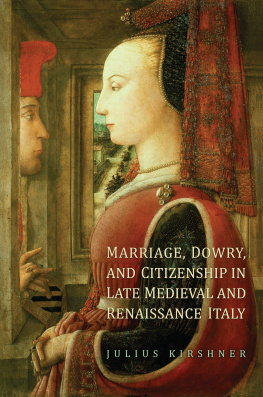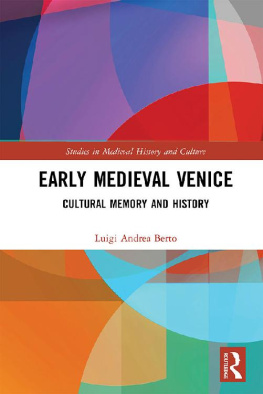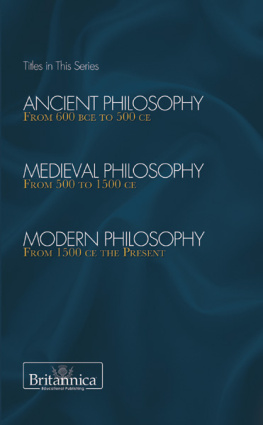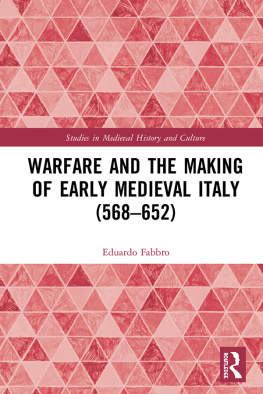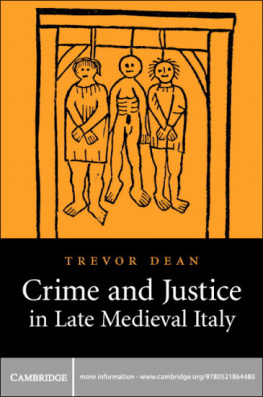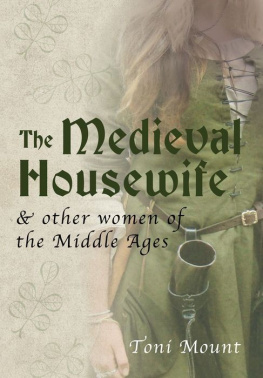To
human concerns,
past and present
First published 1996 by Westview Press
Published 2018 by Routledge
52 Vanderbilt Avenue, New York, NY 10017, USA
2 Park Square, Milton Park, Abingdon, Oxon OX14 4RN
Routledge is an imprint of the Taylor & Francis Group, an informa business
Copyright 1996 Taylor & Francis
All rights reserved. No part of this book may be reprinted or reproduced or utilised in any form or by any electronic, mechanical, or other means, now known or hereafter invented, including photocopying and recording, or in any information storage or retrieval system, without permission in writing from the publishers.
Notice:
Product or corporate names may be trademarks or registered trademarks, and are used only for identification and explanation without intent to infringe.
Library of Congress Cataloging-in-Publication Data
Zupko, Ronald Edward.
Straws in the wind: medieval urban environmental lawthe case of northern Italy/Ronald Edward Zupko and Robert Anthony Laures.
p. cm.
Includes bibliographical references and index.
ISBN 0-8133-2971-X ISBN 0-8133-2972-8 (pbk.)
1. Environmental lawItalyHistory. 2. Refuse and refuse disposalLaw and legislationItalyHistory. 3. Environmental managementItalyHistory. 4. Urban ecologyItalyHistory.
5. Urban healthItalyHistory. I. Laures, Robert Anthony. II. Title
KKH3127.Z87 1996
334.45046dc20
[344.50446]
96-12155
CIP
ISBN 13: 978-0-8133-2972-7 (pbk)
Our thanks go to many individuals and organizations for their assistance and generosity during the research and production of this book. We extend our sincere appreciation to the National Endowment for the Humanities and to Professor Jeffrey Burton Russell of the University of California at Santa Barbara. Much of the research underlying the contemporary philosophical, religious, and legal background that is crucial to the chapters here that relate to the elites visions of the ideal city, urban quality of life, and the local environment was done during the 1993 summer institute entitled Late Antique and Medieval Conceptions of Heaven.
Our research for more than a decade into the numerous statute collections, law codes, and histories of the medieval Italian cities whose environmental legislation forms the basis for this work could not have been accomplished without the deeply appreciated assistance of the interlibrary loan departments of the libraries of Marquette University, the University of Wisconsin at Milwaukee, the University of Wisconsin at Madison, Stanford University, the University of California at Santa Barbara, and the Northern and Southern Regional Library Depositories of the University of California.
Last, we must laud our research assistant, Kathy Callahan, for her long hours of patient and professional work, and the many people whose support and patience during the research and writing of this work sustained our efforts.
Ronald Edward Zupko and Robert Anthony Laures
Milwaukee, Wisconsin
The environmental activists of the early 1960s and 1970s joyfully proclaimed to the world their love of the earth and the environment. Television screens were filled with the brilliantly colored images of happy, smiling young people in exotic dress and long flowing hair proclaiming their oneness with creation and their devotion to peace and love. They were vital, energetic, and positivea driving engine for environmental change and a hallmark of the era.
The final decade of the twentieth century stands witness to a more mature environmental movement, perhaps less flamboyant, but certainly more purposeful. The contemporary desire for clean air and water, for the protection of limited resources, and for the renewal of endangered flora and fauna is often depicted as a modern phenomenon, the product of the enlightened twentieth century. Environmental awareness is portrayed as a thoroughly modern movement, arising out of the tumult of a half-century of war and depression like some Venus given birth in the crashing surf of a Mediterranean shore.
Is this, however, an accurate assessment of the origins of human concern for the environment and endangered resources? In the present study, we present evidence that human beings have been interested in the quality of the environment for almost as long as there are written records available. Men and women have long deemed it their responsibility to tend to the environment and the world about them. The literature on the subject contains innumerable references to their concern for the earth and to their efforts to produce a suitable quality of life in the context of both rural and urban settings. Their desire to create a dependable agricultural resource base, to preserve plants and animals, to tame the excesses of wild rivers and the effects of tidal flows on coastal lowlands, and to enhance the livability of urban environments are chronicled in the earliest extant examples of secular and sacred literature.
Examples of environmental awareness and concern abound in classical literature. Greek philosophers routinely speculated about the role of the human race in creation. Men and women were not conceived of as being mere consumers of the fruits and products of the earth but rather were seen as active participants in the completion of the creation of the world. They had a clearly defined responsibility and role in perfecting the earthly environment. Although individual thinkers might have differed on the role of humans or the extent of their responsibility for the world in which they lived, there was substantial agreement that the human race was the active agent for positive change in the environment.
The Judeo-Christian tradition reflected a similar belief structure. Human beings were still conceived of as being responsible for the earth in partnership with a monotheistic deity. Whereas Greek and Roman thinkers were more comfortable with deities that were often impersonal, remote, indifferent, or simply unconcerned with the human condition, the writers of the Jewish Old Testament tended to perceive God as a personal being genuinely interested in the creation and in the creatures to whom he gave existence. There was a stronger perception that humans and God were engaged in a joint venture designed to complete the divine act of creation. Humankind would work alongside the Creator to perfect creation, as an apprentice toils alongside the master craftsman. There was, thus, a plan, a desired outcome toward which all creation was directed.
The authors of the Old Testament had a reasonably consistent vision of the appearance of the finished product of creation. The image of a pastoral land of milk and honey, given form, appearance, and consistency in the Book of Psalms and other texts, lent substance and reality to the goal of human endeavor. Men and women were not striving for some nebulous, formless intellectual concept of the ideal world. The Old Testament provided a clear, distinctive vision of a delightful pastoral environment that was thoroughly grounded in the real world of human experience and aspirations.



